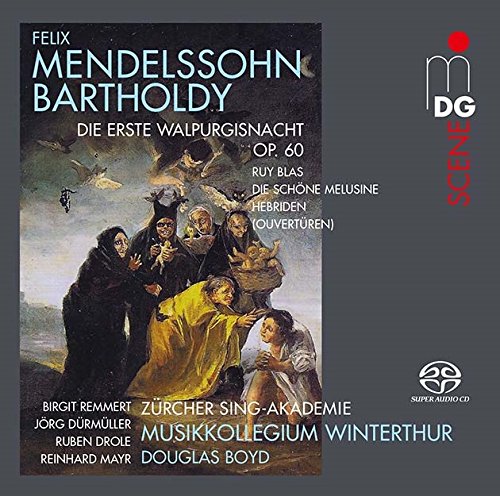MENDELSSOHN Die erste Walpurgisnacht
View record and artist detailsRecord and Artist Details
Composer or Director: Felix Mendelssohn
Genre:
Orchestral
Label: MDG
Magazine Review Date: 07/2016
Media Format: Super Audio CD
Media Runtime: 64
Mastering:
DDD
Catalogue Number: MDG901 1949-6

Tracks:
| Composition | Artist Credit |
|---|---|
| Ruy Blas |
Felix Mendelssohn, Composer
Douglas Boyd, Conductor Felix Mendelssohn, Composer Winterthur Musikkollegium Orchestra |
| (Die) Schöne Melusine |
Felix Mendelssohn, Composer
Douglas Boyd, Conductor Felix Mendelssohn, Composer Winterthur Musikkollegium Orchestra |
| (The) Hebrides, 'Fingal's Cave' |
Felix Mendelssohn, Composer
Douglas Boyd, Conductor Felix Mendelssohn, Composer Winterthur Musikkollegium Orchestra |
| (Die) erste Walpurgisnacht |
Felix Mendelssohn, Composer
Birgit Remmert, Alto Douglas Boyd, Conductor Felix Mendelssohn, Composer Jürg Dürmüller, Tenor Reinhard Mayr, Bass Ruben Drole, Baritone Winterthur Musikkollegium Orchestra Zürcher Sing-Akademie |
Author: Peter Quantrill
Where Boyd allows himself latitude is in the ebb and flow of tempi, which not so long ago was identified with Romantically inclined maestros of old; he played oboe for long enough under Abbado and Harnoncourt to know that what matters is what works. The becalmed sea before the new theme at 8'25" is rather stagily achieved, but I enjoyed the counterbalancing determination to allow no slackening of speed or intent at the overture’s abrupt close.
The Fair Melusine and Ruy Blas, which demand less intervention in the shaping of their stories, work better still. For the latter, Boyd has elected the longer and more elaborated of Mendelssohn’s two versions, neither of which corresponds to the corrupt and posthumously published edition heard ubiquitously until Bärenreiter commissioned Christopher Hogwood to do the scholarly legwork. Brandishing fire and brimstone well worthy of Victor Hugo’s original story, John Eliot Gardiner and the LSO are essential listening in the alternative version.
It’s curious that Mendelssohn should have turned up his nose at Hugo’s story when he had so evidently relished putting a match to Christian pieties in Die erste Walpurgisnacht. The bands are bigger, so too the choral vibrato (not to say wobble), in nearly all the older recordings. The orchestra sounds closer to the microphones than in the overtures, a move that brings the instrumental bass into better focus. With the exception of baritone Ruben Drole as a wild and hairy Druid, the soloists are not well matched to the fresh-voiced chorus, whose weight of tone and volume could usefully have been given a helping hand by the engineers. While the new disc is recommendable on its own terms, with a caveat over the soloists, Kurt Masur’s conducting (Berlin Classics, 9/74) is still unmatched for an informed sense of the fun Mendelssohn had when turning Shakesperean fairy music into Goethe’s culture clash, and giving the pagans all the best (indeed, the only) tunes.
Discover the world's largest classical music catalogue with Presto Music.

Gramophone Digital Club
- Digital Edition
- Digital Archive
- Reviews Database
- Full website access
From £8.75 / month
Subscribe
Gramophone Full Club
- Print Edition
- Digital Edition
- Digital Archive
- Reviews Database
- Full website access
From £11.00 / month
Subscribe
If you are a library, university or other organisation that would be interested in an institutional subscription to Gramophone please click here for further information.




